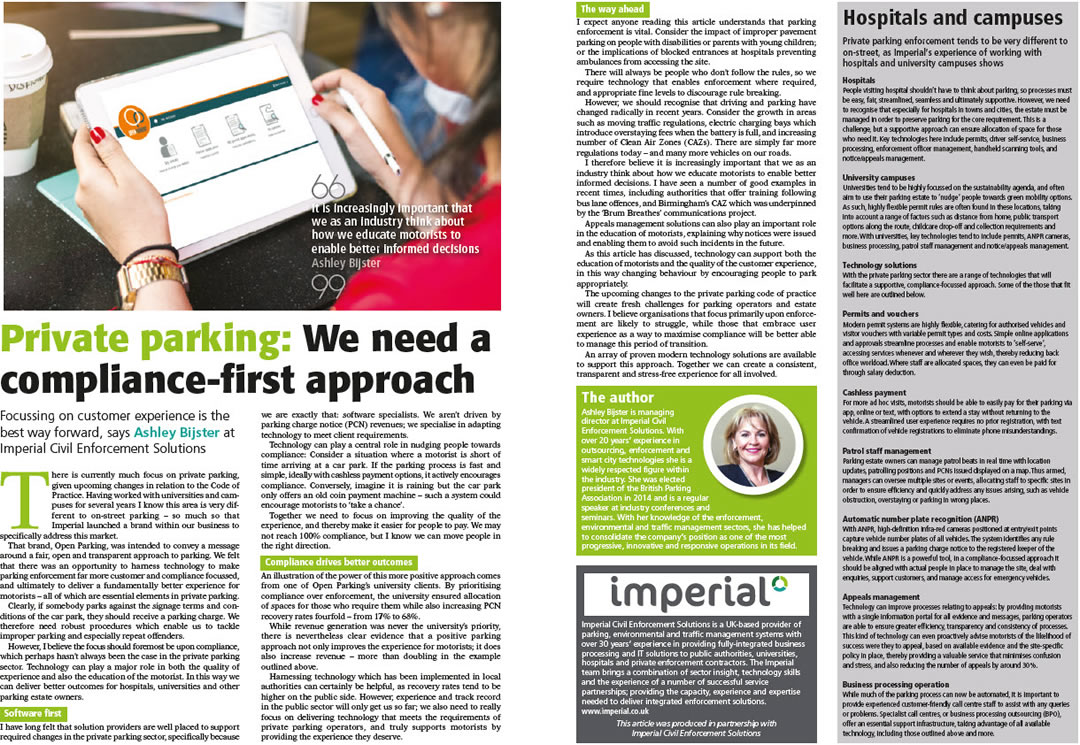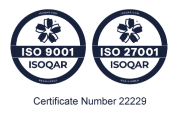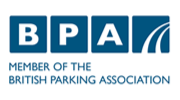Private parking: We need a compliance-first approach
(This article first appeared in Parking Review, July 2022 | #362)
Focussing on customer experience is the best way forward, says Ashley Bijster at Imperial Civil Enforcement Solutions
There is currently much focus on private parking, given upcoming changes in relation to the code of practice. Having worked with universities and campuses for several years I know this area is very different to on-street parking – so much so that Imperial launched a brand within our business to specifically address this market.
That brand, Open Parking, was intended to convey a message around a fair, open and transparent approach to parking. We felt that there was an opportunity to harness technology to make parking enforcement far more customer and compliance focused, and ultimately to deliver a fundamentally better experience for motorists – all of which are essential elements in private parking.
Clearly, if somebody parks against the signage terms and conditions of the car park, they should receive a parking charge. We therefore need robust procedures which enable us to tackle improper parking and especially repeat offenders.
However, I believe the focus should foremost be upon compliance, which perhaps hasn’t always been the case in the private parking sector. Technology can play a major role in both the quality of experience and also the education of the motorist. In this way we can deliver better outcomes for hospitals, universities and other parking estate owners.
We therefore need robust procedures which enable us to tackle improper parking and especially repeat offenders
Software first
I have long felt that solution providers are well placed to support required changes in the private parking sector, specifically because we are exactly that: software specialists. We aren’t driven by parking charge notice (PCN) revenues; we specialise in adapting technology to meet client requirements.
Technology can play a central role in nudging people towards compliance: Consider a situation where a motorist is short of time arriving at a car park. If the parking process is fast and simple, ideally with cashless payment options, it actively encourages compliance. Conversely, imagine it is raining but the car park only offers an old coin payment machine – such a system could encourage motorists to ‘take a chance’.
Together we need to focus on improving the quality of the experience, and thereby make it easier for people to pay. We may not reach 100% compliance, but I know we can move people in the right direction.
Compliance drives better outcomes
An illustration of the power of this more positive approach comes from one of Open Parking’s university clients. By prioritising compliance over enforcement, the university ensured allocation of spaces for those who require them while also increasing PCN recovery rates fourfold – from 17% to 68%.
While revenue generation was never the university’s priority, there is nevertheless clear evidence that a positive parking approach not only improves the experience for motorists; it does also increase revenue – more than doubling in the example outlined above.
Harnessing technology which has been implemented in local authorities can certainly be helpful, as recovery rates tend to be higher on the public side. However, experience and track record in the public sector will only get us so far; we also need to really focus on delivering technology that meets the requirements of private parking operators, and truly supports motorists by providing the experience they deserve.
It is increasingly important that we as an industry think about how we educate motorists to enable better informed decisions
The way ahead
I expect anyone reading this article understands that parking enforcement is vital. Consider the impact of improper pavement parking on people with disabilities or parents with young children; or the implications of blocked entrances at hospitals preventing ambulances from accessing the site.
There will always be people who don’t follow the rules, so we require technology that enables enforcement where required, and appropriate fine levels to discourage rule breaking.
However, we should recognise that driving and parking have changed radically in recent years. Consider the growth in areas such as moving traffic regulations, electric charging bays which introduce overstaying fees when the battery is full, and increasing number of Clean Air Zones (CAZs). There are simply far more regulations today – and many more vehicles on our roads. I therefore believe it is increasingly important that we as an industry think about how we educate motorists to enable better informed decisions. I have seen a number of good examples in recent times, including authorities that offer training following bus lane offenses, and Birmingham’s CAZ which was underpinned by the ‘Brum Breathes’ communications project.
Appeals management solutions can also play an important role in the education of motorists, explaining why notices were issued and enabling them to avoid such incidents in the future.
As this article has discussed, technology can support both the education of motorists and the quality of the customer experience, in this way changing behaviour by encouraging people to park appropriately.The upcoming changes to the private parking code of practice will create fresh challenges for parking operators and estate owners. I believe organisations that focus primarily upon enforcement are likely to struggle, while those that embrace user experience as a way to maximise compliance will be better able to manage this period of transition.
An array of proven modern technology solutions are available to support this approach. Together we can create a consistent, transparent and stress-free experience for all involved.
Hospitals and campuses
Private parking enforcement tends to be very different to on-street, as Imperial’s experience of working with hospitals and university campuses shows
Hospitals
People visiting hospital shouldn’t have to think about parking, so processes must be easy, fair, streamlined, seamless and ultimately supportive. However, we need to recognise that especially for hospitals in towns and cities, the estate must be managed in order to preserve parking for the core requirement.
This is a challenge, but a supportive approach can ensure allocation of space for those who need it. Key technologies here include permits, driver self-service, business processing, enforcement officer management, handheld scanning tools, and notice/appeals management.
University campuses
Universities tend to be highly focused on the sustainability agenda, and often aim to use their parking estate to ‘nudge’ people towards green mobility options. As such, highly flexible permit rules are often found in these locations, taking into account a range of factors such as distance from home, public transport options along the route, childcare drop-off and collection requirements and more. With universities, key technologies tend to include permits, ANPR cameras, business processing, patrol staff management and notice/appeals management.
Technology solutions
With the private parking sector there are a range of technologies that will facilitate a supportive, compliance-focused approach. Some of the those that fit well here are outlined below.
Permits and vouchers
Modern permit systems are highly flexible, catering for authorised vehicles and visitor vouchers with variable permit types and costs. Simple online applications and approvals streamline processes and enable motorists to ‘self-serve’, accessing services whenever and wherever they wish, thereby reducing back office workload. Where staff are allocated spaces, they can even be paid for through salary deduction.
Cashless payment
For more ad hoc visits, motorists should be able to easily pay for their parking via app, online or text, with options to extend a stay without returning to the vehicle. A streamlined user experience requires no prior registration, with text confirmation of vehicle registrations to eliminate phone misunderstandings.
Patrol staff management
Parking estate owners can manage patrol beats in real time with location updates, patrolling positions and PCNs issued displayed on a map. Thus armed, managers can oversee multiple sites or events, allocating staff to specific sites in order to ensure efficiency and quickly address any issues arising, such as vehicle obstruction, overstaying or parking in wrong places.
Automatic number plate recognition (ANPR)
With ANPR, high-definition infra-red cameras positioned at entry/exit points capture vehicle number plates of all vehicles. The system identifies any rule breaking and issues a parking charge notice to the registered keeper of the vehicle. While ANPR is a powerful tool, in a compliance-focused approach it should be aligned with actual people in place to manage the site, deal with enquiries, support customers, and manage access for emergency vehicles.
Appeals management
Technology can improve processes relating to appeals: by providing motorists with a single information portal for all evidence and messages, parking operators are able to ensure greater efficiency, transparency and consistency of processes.This kind of technology can even proactively advise motorists of the likelihood of success were they to appeal, based on available evidence and the site-specific policy in place, thereby providing a valuable service that minimises confusion and stress, and also reducing the number of appeals by around 30%.
Business processing operation
While much of the parking process can now be automated, it is important to provide experienced customer-friendly call centre staff to assist with any queries or problems. Specialist call centres, or business processing outsourcing (BPO), offer an essential support infrastructure, taking advantage of all available technology, including those outlined above and more.
Company Registration Number: 02023383 ¦ Registered Office Address: Century House, 1 The Lakes, Northampton, NN4 7HD





